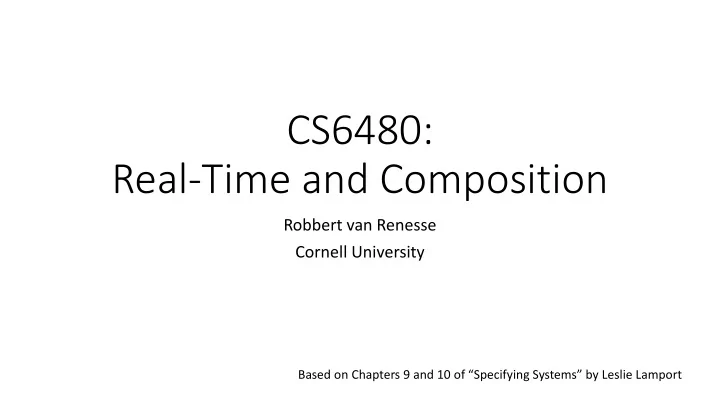

CS6480: Real-Time and Composition Robbert van Renesse Cornell University Based on Chapters 9 and 10 of “Specifying Systems” by Leslie Lamport
Recall: HourClock
Recall: HourClock
Can we create an HourClock that ticks (approximately) once an hour?
Specifying Real-Time Note: takes discrete steps
Specifying Real-Time Why this?
Composing HourClock and RealTime Can we create a spec that extends HourClock to “tick” at (approximately) regular intervals, like a physical clock? Allowed steps in composition: Clock ticks are instantaneous Time progresses between ticks
Real-time HourClock • Want time between HCnxt steps to be approximately one hour on the real-time clock • Real clocks drift!! • If ! is the time in seconds between two steps, then we want • 3600 − & ≤ ! ≤ 3600 + & • We call & the “drift” of a clock (not to be confused with “skew” ) )
Bounding time between HCnxt steps
Bounding time between HCnxt steps We’re going to want to hide t
Real-Time HourClock
Real-Time HourClock Why do we need this?
Composition of Specifications • Given two or more specifications, looking for set of behaviors that satisfy all specifications è Composition is the conjunction of specifications Let’s compose two instantiations of HourClock and see what happens…
Rewriting HourClock a bit
TwoClocks Spec
TwoClocks Spec Not in the “standard” form !"#$ ∧ ☐ ['()$] +,-.
TwoClocks Spec
Cont’d
TwoClocks Spec “standard” form !"#$ ∧ ☐ ['()*$] ,-./
TwoClocks Spec Clocks can progress simultaneously!
TwoClocks Spec Clocks can progress simultaneously! If we don’t want this, can write:
Performance properties 1. Step must complete within ! time: safety property • “hard real-time” 2. Step must complete within ! time on average: hyperproperty • Implied by 1 3. Step must eventually occur: liveness property • Implied by 1 or 2 TLA+ only allows specifying properties • A property is a set of behaviors (infinite traces) each satisfying some predicate • “response time < ! ” is a predicate over a single behavior • “average response time < !” is a predicate over a set of behaviors
Tools for checking hyperproperties • Some hyperproperties just involve small sets of behaviors • 2-Safety: two behaviors provide a counterexample • Security example: “Observational Determinism” • Behavior of public variables is deterministic • Independent of behavior of private variables or scheduler • Bad : pair of traces that cause system to look nondeterministic to low observer • Can be handled in TLA+ using “self-composition” • Like TwoClocks • Can be model-checked, TLAPS, … • Still can’t handle average response time… • Good : average time over all behaviors is low enough • Alternative tools: HyperLTL, HyperCTL, Hyper modal μ-calculus
Recommend
More recommend